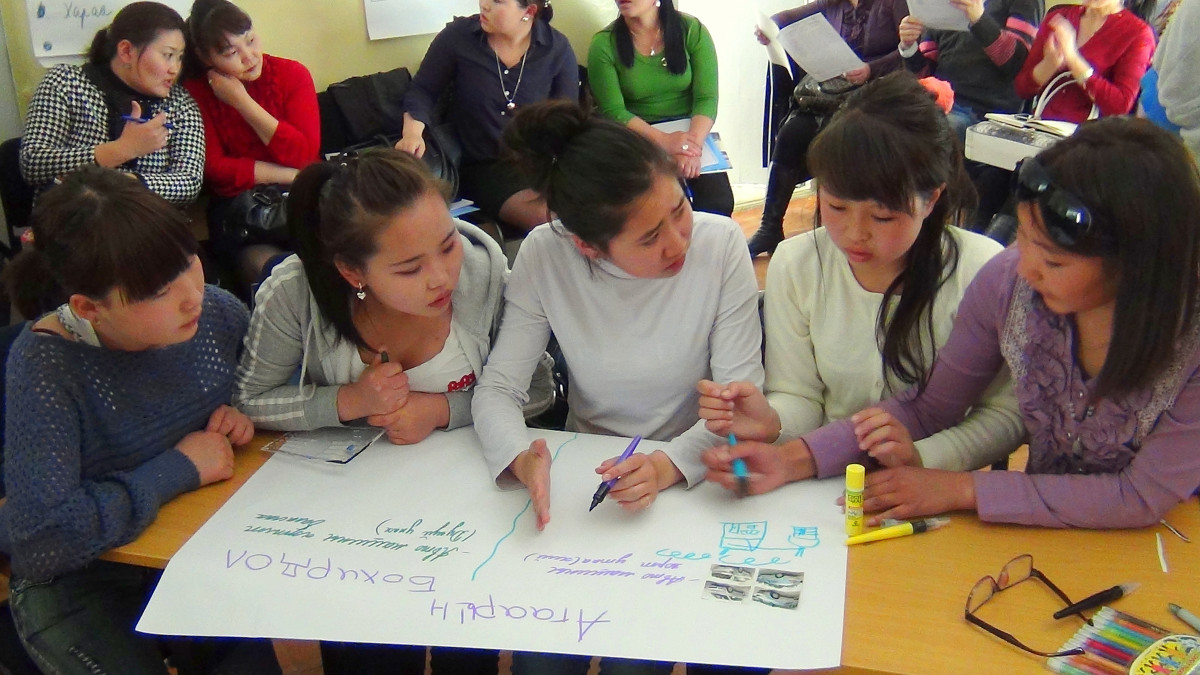Thanks to documentary films, we learn about our problems, says Mongolian student Anudari
Published: Aug 13, 2014 Reading time: 4 minutes Share: Share an articleMore than 15,000 students of 24 Mongolian colleges and vocational schools have learnt about human rights thanks to documentary films screenings since spring 2013. This year, additional 5000 students from 50 schools will join the project funded by EU and Czech Development Agency. 150 teachers from Darkhan-Uul, Archangaj, Uvurchangaj, Tov, Gobi-Sumber and Ulanbaatar aimags, what is an area three times larger comparing to the Czech Republic, have already experienced teaching on the basis of One World in Schools didactic toolkits.

During lessons, trained teachers use documentary films from the One World festival in order to increase students` awareness about human rights. Students are also involved in activities against discrimination of various groups of citizens. „Documentary films provide us an opportunity for learning not only about life in Mongolia, but also abroad and thus we learn about problems which are actual for us as well,“ says fifteen-years old Anudari, which attends 10th class in a school located in Darkhan Úl aimag.
Besides screenings during the lessons, Anudari also attends a film club where students with teachers` support organize besides screenings also voluntary activities contributing to solving problems on local community level. Thanks to the film To vsechno z lasky by Tomas Kudrna, Anudari already knows about possible consequences of domestic violence. She has also learned about what to do in case of getting across domestic violence in her neighborhood. „I think, that the film clubs are very interesting and useful,“ she says.
High level of domestic violence or human trafficking and sexual abuse are among the most pressing isues of today`s Mongolia. Besides these prolems, the documentary films promote other topics like life with disability, child labour or women rights during school screenings for young people in frame of lessons or film clubs. The purpose of the film clubs is to inform young people and teach them how to think about the reality from different perspective.
#~gallery-868~#
„For example, after screening the documentary „Flying Anna“ about life with disability, children are asked to imagine that they have certain disability. If they, for example, play a role of a blind person, they walk blindfolded in the classroom and afterwards share their feelings with other classmates“, explains Pavla Pijanova, Coordinator of PIN projects in Mongolia.
Such activities are aimed at increasing tolerance of young people to differences. The proof of the fact that the experience from seeing a documentary does not end just after the screening itself but that has impact to everyday life of students is a school from Darkhan Uul aimag. Local students decided to start helping poor families with disabled children from their neighbourhood after watching a documentary film about life with disability.
Workshops for teachers are key element of PIN work at Mongolian schools. Teachers are explaind the methodology of using documentary films in their lessons. They are tought how to organize film clubs and we also assist them with preparing the most suitable follow up activities for each documentary film in order to make the students interested and think about the subject of the screened film. In 2014, 100 newly involved teachers will start using documentary films in their lessons.
See the trailer for One World in Schools for mongolian students
Besides watching the documentaries, students always discusse the topic of the filmh after each screening. Teachers can also incorporate additional interactive activities into the lesson, so the students deepen their experience with the topic as well as they have a chance to openly share their own opinion with their classmates. Each trained teacher has access to on-line videotheque containing 16 selected films and didactic material with examples of follow up activities which the teachers can involve into their lessons after screening in order to enable them teaching about each subject deeply.
 PIN provides training to students as well. „During the project, student film club leaders take part on educational workshops. Within the workshops, the participants will be taught how to plan and organize activities aiming at solving local prolems, says Oyungerel Batbaar, the project coordinator in Mongolia. The best youth inictiatives will be financially supported so we will enable selected young people experience that the they can change their neighbourhood by their own involvment, she adds.
PIN provides training to students as well. „During the project, student film club leaders take part on educational workshops. Within the workshops, the participants will be taught how to plan and organize activities aiming at solving local prolems, says Oyungerel Batbaar, the project coordinator in Mongolia. The best youth inictiatives will be financially supported so we will enable selected young people experience that the they can change their neighbourhood by their own involvment, she adds.
The programme One World in Schools in Mongolia is funded by European Commission (EIDHR) and Czech Development Agency. The programme has been implemented In Mongolia since 2013. The One World in Schools programme is curently implemented also in Armenia, Georgia and Moldova.
